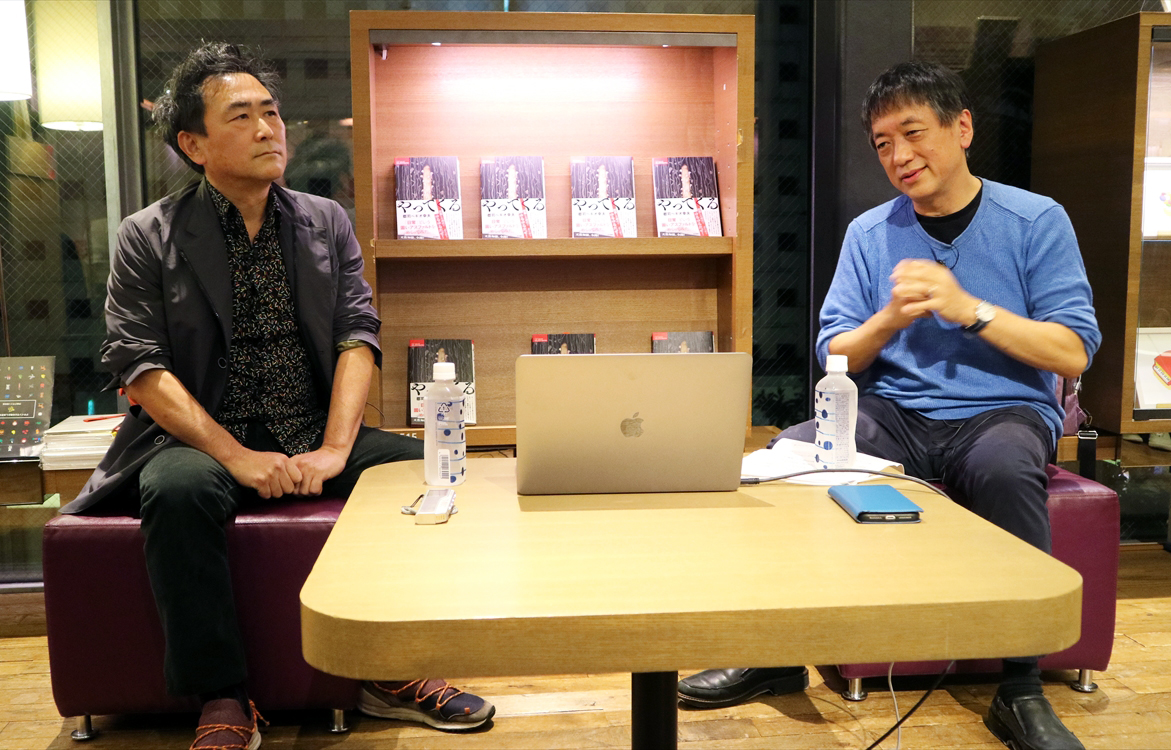[Event Report] Talk event between Pegio Gunji and Shinji Miyadai, "Towards a World of Uncoolness and Uncoolness" Transcript ①
~Image of "coming"~
host: Sorry to have kept you all waiting. Today, we will be talking with Shinji Miyadai about the second event for the publication of "Yarukuru" by Pegio Gunji Yukio, titled "Towards a World of Uncoolness and Uncoolness." Last time, when I was preparing for a talk event with Masayuki Osawa, I was in charge of online events, and for some reason, I had a rare beef bowl at Family Mart for dinner. "I usually eat sandwiches, so why did I have to have a beef bowl?" I thought. Then, after the event, I thought, "Oh, beef bowls appeared in 'Yarukuru'." I had completely forgotten about it, and last night, after eating dinner, I thought, "Tomorrow is 'Yarukuru'," and then...
Miyadai:It was beef bowl again (laughs).
host: (laughs) I wonder what I did wrong, because last night's dinner was also gyudon, so I'm looking forward to hearing your story today, wondering how dinner and gyudon came to be linked in my mind. Thank you very much.
Miyadai: Thank you very much. (pointing at the moderator) It was my wife. She told me something very interesting, and I thought it could be interpreted in terms of the "coming" diagram. Normally, this would be a case of association. "In the story about 'coming', there was a mention of beef bowls. So, when you think of Gunji, beef bowls come to mind." If it was an association, you would be aware of it that way, but in my wife's case, it wasn't.
In other words, the image of Mr. Gunji Pegio Yukio exists as a signifier, but the signified assigned to it is insufficient, creating a vague gap = an underdetermined state, and because there happened to be a context in which I had to cook something, something "comes". That was beef bowl. Then, even though the underdetermined state does not become a determined state, "the problem disappears". That's what I immediately understood, but am I wrong (laughs).
Gunji:That's how it is. (laughs)

~What "comes" after infinite regression~
Miyadai:First of all, I think you've all read it, but I'll briefly explain what kind of consistent diagram there was. The keywords are the "frame problem" and the "unwritten enclosure" -- the Spencer-Brown problem. Both are related to each other.
In the case of the beef bowl, there is an inconsistency between the signifier and the signified = an underdetermined state. Normally, we would assign a context to this and understand that the underdetermined state has become a determined state. However, this context is tricky. How far should the context be referenced? What about the context that determines the meaning of the context? If we follow the context of the context of the context, we end up with an infinite regress and cannot make a decision. This is why the AI cannot make a decision. It takes an infinite amount of time to make a decision, so it gets stuck.
Spencer Brown came up with something that resembles an answer. The meaning is given by instructions. The instructions are equivalent to drawing an enclosure on a piece of paper. But that's not the end of it. You have to tell them which piece of paper you drew it on. So you draw another enclosure outside the enclosure. But you have to tell them where you drew the other enclosure outside the enclosure. An enclosure outside an enclosure outside an enclosure outside an enclosure... The enclosures pile up and become infinite. It has the same format as the frame problem.
However, according to him, the infinite enclosure mysteriously fulfills a certain function. He calls it the "unwritten enclosure." From here on, my own interpretation comes in. The act of "writing" the infinite enclosure takes an infinite amount of time. But it actually functions. That is, the moment the first enclosure is written, something that requires infinite time "arrives." In my words, there is a "visit from the world (every whole)."
I use this diagram to explain what Yamauchi Tokuryu calls "lemmas," a concept that Nakazawa Shinichi also takes issue with. Something that would require an infinite number of times = an infinite amount of time if it were closed off by logos is somehow anticipated in advance in the activities of logos. That's a lemma. The diagram in which logos only works once a lemma is a given is the same as the diagram in which an "unwritten enclosure" is a given and the instructions of the enclosure are driven by that enclosure. In that sense, Gunji's "Coming" consistently asserts that "there is a 'gap' due to the underdetermination of the signified, and the accidental context is the trigger, and what should be obtained by the infinite retroactive recursion of the context 'comes,'" and is close to the Spencer-Brown diagram, which solves the frame problem with an "unwritten enclosure."
In my own words, it is because of this "visit from the world" that one gets the feeling of "understanding," and is able to escape the anxiety of infinite regress. So, as in "Coming," things that "come" from outside are not a source of anxiety, but rather gospel. This pattern is consistent throughout the book. However, there are times when something that is supposed to "come" from outside does not actually arrive. This is the thing about death. This is shown in the final chapter on death. The key word there is the rhinoceros beetle.
The beetle is "a singularity that supports the coexistence of a frontier, like a horizon beyond which one cannot see, and a boundary that separates this side from the other side." Its existence "comes" something and opens us up to the coming of death. Death appears as something to be accepted, rather than something to be confused about. That is the argument. This is also interesting. "Accepting death" and "wanting to make gyudon" are thought to be issues of different dimensions, but the same diagram can be consistent from everyday life to talk about transcendence. In that sense, I thought it was a very dramatic book (laughs). I intended this to be an explanation for people who read the book and are somewhat vague.
--Continued in No.2
Speakers:Pegio Yukio Gunji(Gunji)・ Shinji Miyadai(Miyadai)
Transcription: Makoto Wakaizumi (Miyadai Seminar)























